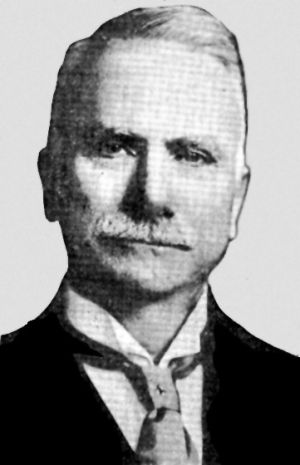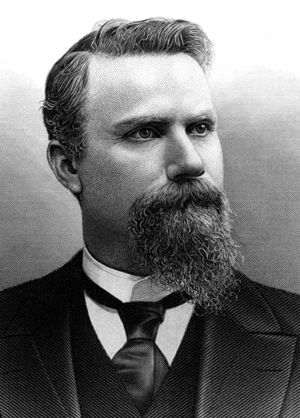A. O. Lane: Difference between revisions
No edit summary |
No edit summary |
||
| (18 intermediate revisions by 2 users not shown) | |||
| Line 1: | Line 1: | ||
[[Image:A_O_Lane.jpg|right|thumb| | [[Image:A O Lane 1887.jpg|right|thumb|A. O. Lane in 1887]] | ||
'''Alexander Oscar | [[Image:A_O_Lane.jpg|right|thumb|Later portrait of A. O. Lane. {{BPL permission caption|http://bplonline.cdmhost.com/u?/p4017coll2,606}}]] | ||
'''Alexander Oscar Lane''' (born [[October 29]], [[1848]] in Macon County; died [[March 2]], [[1916]] in [[Birmingham]]) was a lawyer, newspaper editor, judge and the [[Mayor of Birmingham]] from [[1882]] to [[1888]] and from [[1890]] to [[1892]]. | |||
Lane was the son of Dr Alexander and Mary E. Phillips Lane who moved to Alabama from Georgia. After graduating from private school he worked as principal of a boys' high school in Clayton while reading law under Chancellor John A. Foster. He was admitted to the bar in [[1869]] and began his practice in Ozark before moving to the young city of [[Birmingham]] in [[1873]]. | Lane was the son of Dr Alexander and Mary E. Phillips Lane who moved to Alabama from Georgia. After graduating from private school he worked as principal of a boys' high school in Clayton while reading law under Chancellor John A. Foster. He was admitted to the bar in [[1869]] and began his practice in Ozark before moving to the young city of [[Birmingham]] in [[1873]]. | ||
In Birmingham Lane became a partner of [[John Terry]] | In Birmingham Lane became a partner of [[John Terry]] in the firm of [[Terry & Lane]]. He marrying his partner's daughter [[Minnie Lane|Minnie]] in May [[1875]]. After Terry's retirement he took on [[Edwin Taliaferro]] and [[B. H. Tabor]] as partners in the firm of [[Lane, Taliaferro & Tabor]] with offices in the [[Roden Block|Roden Building]]. That partnership dissolved in [[1887]]. Later he was an associate of [[Frank White]]. | ||
In [[1880]] Lane became editor of the ''[[Birmingham Iron Age]]''. Two years later he was [[1882 Birmingham mayoral election|elected Mayor]] outright in a four-way race. He won re-election in [[1884]] and [[1886]]. | In [[1880]] Lane became editor of the ''[[Birmingham Iron Age]]''. Two years later he was [[1882 Birmingham mayoral election|elected Mayor]] outright in a four-way race, marred by disorder, on [[December 3]]. He won re-election in [[1884]] and [[1886 Birmingham mayoral election|1886]]. In August [[1884]], early in his second term, Lane directed the exploration of a [[underground river|crevice]] which had opened into a storm sewer on [[5th Avenue North]]. Two strong men secured by ropes explored the opening and heard running water. Lane desired that the stream be researched as a possible source of water, or as part of the city drainage system. | ||
Lane decided not to run in [[1888]], but was convinced to put his name in for the [[1890 Birmingham mayoral election|1890 election]], which he again won. At the end of that two-year term he served as a delegate to the Democratic National Convention and was appointed an Associate Justice for the [[10th Judicial Circuit of Alabama]] by Governor [[B. B. Comer]]. He was subsequently re-elected to that position twice before resigning so that he could take a seat on the newly-formed [[Birmingham Board of Commissioners]] in [[1911]]. | |||
As an editor, executive and judge, Lane's career was marked by decisiveness, fairness and directness. He rapidly formed a clear understanding of the issues placed before him and was prompt to formulate their resolution and to take the proper action. Beginning in [[1896]] Lane secured the purchase of 200-acres on the south slope of [[Red Mountain]] for use by the city. The property was the home of [[Red Mountain Cemetery]], used for the burial of paupers. In addition to his legal and political positions, Lane served as president of the [[Smithfield Land Company]] and was director of the [[Alabama State Bank]] and the [[Iron and Oak Insurance Company]]. | As an editor, executive and judge, Lane's career was marked by decisiveness, fairness and directness. He rapidly formed a clear understanding of the issues placed before him and was prompt to formulate their resolution and to take the proper action. Beginning in [[1896]] Lane secured the purchase of 200-acres on the south slope of [[Red Mountain]] for use by the city. The property was the home of [[Red Mountain Cemetery]], used for the burial of paupers. In addition to his legal and political positions, Lane served as president of the [[Smithfield Land Company]] and was director of the [[Alabama State Bank]] and the [[Iron and Oak Insurance Company]]. | ||
Lane built a [[A. O. Lane residence|residence]] at the corner of [[8th Avenue North]] and [[19th Street North|19th Street]] in [[ | In [[1884]] Mayor Lane's [[A. O. Lane residence|residence]] was located on the northeast corner of [[3rd Avenue North]] and [[23rd Street North|23rd Street]]. In [[1887]] Lane built a [[1887 A. O. Lane residence|new residence]] at the corner of [[8th Avenue North]] and [[19th Street North|19th Street]]. | ||
Lane died in March [[1916]] from a stroke (then termed "apoplexy"). The [[Birmingham City Commission]] closed [[Birmingham City Hall (1901)|City Hall]] to allow workers to attend the funeral, and [[Mayor of Birmingham|Mayor]] [[George Ward]] ordered the portraits of all former mayors covered with black crepe for 30 days. | |||
Lane | Lane is buried at [[Oak Hill Cemetery]]. He and his wife had five children. During his life, Lane refused to allow any monuments, parks or projects to be named for him. The Red Mountain parcel, however, was dedicated to his memory in [[1934]] as [[Lane Park]]. It eventually became the home of the [[Birmingham Zoo]] and [[Birmingham Botanical Gardens]]. | ||
{{start box}} | {{start box}} | ||
| Line 18: | Line 23: | ||
before=[[Thomas Jeffers]] | | before=[[Thomas Jeffers]] | | ||
title=[[Mayor of Birmingham]] | | title=[[Mayor of Birmingham]] | | ||
years=[[ | years=[[1882]]—[[1888]] | | ||
after=[[B. A. Thompson]] | after=[[B. A. Thompson]] | ||
}} | }} | ||
| Line 24: | Line 29: | ||
before=[[B. A. Thompson]] | | before=[[B. A. Thompson]] | | ||
title=[[Mayor of Birmingham]] | | title=[[Mayor of Birmingham]] | | ||
years=[[1890]] | years=[[1890]]—[[1892]] | | ||
after=[[David Fox]] | after=[[David Fox]] | ||
}} | }} | ||
| Line 31: | Line 36: | ||
==References== | ==References== | ||
* Evans, F. V. "Alexander Oscar Lane", biographical profile in {{Dubose-1887}} | * Evans, F. V. "Alexander Oscar Lane", biographical profile in {{Dubose-1887}} | ||
* "Prominent citizen dead." (March 2, 1916) ''[[Birmingham Age-Herald]]'' | |||
* {{Owen-1921}} | * {{Owen-1921}} | ||
* Beiman, Irving (January 17, 1934) "[http://bplonline.cdmhost.com/u?/p4017coll2,606 Burial site for pauper dead of City, now valuable, to be dedicated as park]. ''Birmingham Post'' - accessed via BPL Digital Collections | * Beiman, Irving (January 17, 1934) "[http://bplonline.cdmhost.com/u?/p4017coll2,606 Burial site for pauper dead of City, now valuable, to be dedicated as park]. ''Birmingham Post'' - accessed via BPL Digital Collections | ||
| Line 39: | Line 45: | ||
[[Category:Principals]] | [[Category:Principals]] | ||
[[Category:Attorneys]] | [[Category:Attorneys]] | ||
[[Category: | [[Category:Birmingham mayors]] | ||
[[Category:Judges]] | [[Category:Judges]] | ||
[[Category:Birmingham City Commission]] | [[Category:Birmingham City Commission]] | ||
[[Category:Birmingham Board of Education]] | [[Category:Birmingham Board of Education]] | ||
[[Category:Oak Hill burials]] | [[Category:Oak Hill burials]] | ||
Latest revision as of 15:26, 28 October 2023

Alexander Oscar Lane (born October 29, 1848 in Macon County; died March 2, 1916 in Birmingham) was a lawyer, newspaper editor, judge and the Mayor of Birmingham from 1882 to 1888 and from 1890 to 1892.
Lane was the son of Dr Alexander and Mary E. Phillips Lane who moved to Alabama from Georgia. After graduating from private school he worked as principal of a boys' high school in Clayton while reading law under Chancellor John A. Foster. He was admitted to the bar in 1869 and began his practice in Ozark before moving to the young city of Birmingham in 1873.
In Birmingham Lane became a partner of John Terry in the firm of Terry & Lane. He marrying his partner's daughter Minnie in May 1875. After Terry's retirement he took on Edwin Taliaferro and B. H. Tabor as partners in the firm of Lane, Taliaferro & Tabor with offices in the Roden Building. That partnership dissolved in 1887. Later he was an associate of Frank White.
In 1880 Lane became editor of the Birmingham Iron Age. Two years later he was elected Mayor outright in a four-way race, marred by disorder, on December 3. He won re-election in 1884 and 1886. In August 1884, early in his second term, Lane directed the exploration of a crevice which had opened into a storm sewer on 5th Avenue North. Two strong men secured by ropes explored the opening and heard running water. Lane desired that the stream be researched as a possible source of water, or as part of the city drainage system.
Lane decided not to run in 1888, but was convinced to put his name in for the 1890 election, which he again won. At the end of that two-year term he served as a delegate to the Democratic National Convention and was appointed an Associate Justice for the 10th Judicial Circuit of Alabama by Governor B. B. Comer. He was subsequently re-elected to that position twice before resigning so that he could take a seat on the newly-formed Birmingham Board of Commissioners in 1911.
As an editor, executive and judge, Lane's career was marked by decisiveness, fairness and directness. He rapidly formed a clear understanding of the issues placed before him and was prompt to formulate their resolution and to take the proper action. Beginning in 1896 Lane secured the purchase of 200-acres on the south slope of Red Mountain for use by the city. The property was the home of Red Mountain Cemetery, used for the burial of paupers. In addition to his legal and political positions, Lane served as president of the Smithfield Land Company and was director of the Alabama State Bank and the Iron and Oak Insurance Company.
In 1884 Mayor Lane's residence was located on the northeast corner of 3rd Avenue North and 23rd Street. In 1887 Lane built a new residence at the corner of 8th Avenue North and 19th Street.
Lane died in March 1916 from a stroke (then termed "apoplexy"). The Birmingham City Commission closed City Hall to allow workers to attend the funeral, and Mayor George Ward ordered the portraits of all former mayors covered with black crepe for 30 days.
Lane is buried at Oak Hill Cemetery. He and his wife had five children. During his life, Lane refused to allow any monuments, parks or projects to be named for him. The Red Mountain parcel, however, was dedicated to his memory in 1934 as Lane Park. It eventually became the home of the Birmingham Zoo and Birmingham Botanical Gardens.
| Preceded by: Thomas Jeffers |
Mayor of Birmingham 1882—1888 |
Succeeded by: B. A. Thompson |
| Preceded by: B. A. Thompson |
Mayor of Birmingham 1890—1892 |
Succeeded by: David Fox |
References
- Evans, F. V. "Alexander Oscar Lane", biographical profile in Dubose, John Witherspoon (1887) Jefferson County and Birmingham, Alabama: Historical and Biographical Birmingham: Teeple & Smith, Publishers; Caldwell Printing Works.
- "Prominent citizen dead." (March 2, 1916) Birmingham Age-Herald
- Owen, Thomas McAdory and Marie Bankhead Owen (1921) History of Alabama and Dictionary of Alabama Biography. 4 volumes. Chicago, Illinois: S. J. Clarke Publishing Co.
- Beiman, Irving (January 17, 1934) "Burial site for pauper dead of City, now valuable, to be dedicated as park. Birmingham Post - accessed via BPL Digital Collections
